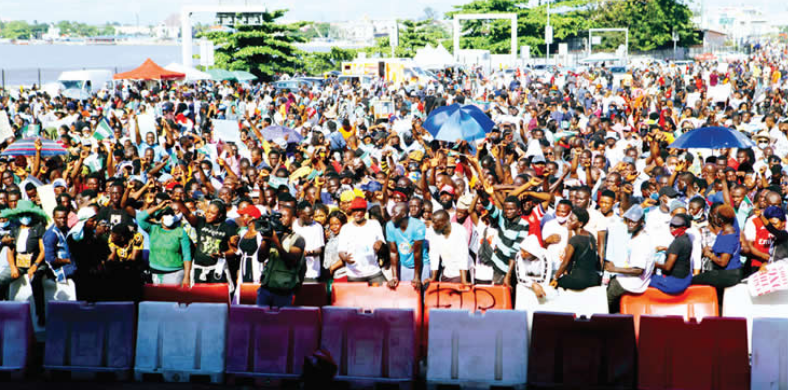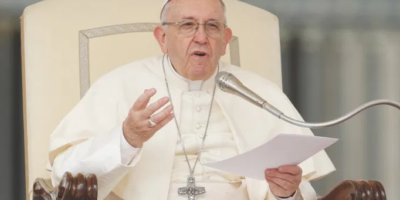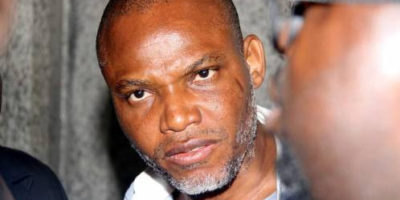Lekki Shootings: We Hid Behind Barricades To Escape – Eyewitnesses

With an emotion-laden voice, Philip Chukwu initially refused to relive his experience on Tuesday at the Lekki Toll Gate area of Lagos. He said he was still in shock and unwilling to grant any interview. But after much persuasion, the 29-year-old teacher at one of the private schools on Lagos Island obliged, on condition that neither his audio nor picture would be published.
He said scores of youths had gathered at the Toll Gate area, playing music and eating, in continuation of the #EndSARS protests that had lasted about two weeks in the country.
Earlier in the day, Governor Babajide Sanwo-Olu had declared a 24-hour curfew which was to start by 4pm but later postponed to 9pm. The governor declared the movement restriction due to reports of killings by the police and reprisals by the people, as well as the burning of police stations and public property.
Sanwo-Olu premised his decision on the fact that some hoodlums had hijacked the peaceful protests.
But despite the curfew, protesters still gathered at the Tollgate; epicentre of the #EndSARS protests.
Chukwu said they sat on the ground and as it got darker, he said he noticed the lights that were usually turned on at the area had been switched off. According to him, it was around 6pm.
Later, Chukwu said he saw trucks arriving with soldiers – adding that thereafter, national flags were distributed among those who gathered there, even as someone told them that if they sat down and sang the national anthem while waving the flags, no soldier would shoot at them.
He said it was not the case that day.
He said,
At around 7pm, we started singing the national anthem and waving the national flag when the soldiers started shooting at us. I observed that they cornered us and mounted barricades before the shooting. We did not upset them in any way. I was even joking with one of the soldiers who looked young that he should join us in protesting against bad governance. He did not laugh, though.
Not long after was when the shooting started. The soldiers shot into the air and then at protesters trying to flee because of panic. I thought I was going to die but I hid behind some barricades with others, and luckily we were not hit.
After several minutes of shooting, they left and I had to flee the scene. As I was fleeing, I saw many people wounded on the ground, with blood on the ground. Some would have died.
Chukwu said since the incident happened, he had not been able to sleep properly as memories of the incident kept flashing back.
Up till now, I really can’t believe why soldiers would be deployed to the protest ground because we had been peaceful from the first day of the demonstration,
he said.
Another eyewitness and resident of Lekki, Kingsley Omooba, said they were singing the national anthem while sitting on the ground when the soldiers started shooting at them.
He also said unlike in the previous days when lights were usually turned on at the tollgate, they were turned off on Tuesday night.
He told Flavision:
We were not violent when the soldiers started opening fire at us. I initially thought they were there to protect us when I saw their trucks. But they fired at us. I hid behind a barricade to escape the gunshots. My heart is broken. I wept like a baby that night.
Actually, I had thought to leave the scene by 8pm since the curfew was postponed to 9pm. But seeing soldiers at past 6pm was what I could not understand. I even thought they would disperse us with whips or teargas. I had been protesting daily at the tollgate and we had been law-abiding. If they had requested us to leave, I’m sure people would have left gently.
Meanwhile, the Nigerian Army has denied deploying soldiers to the Lekki Tollgate and even described the videos of the killings as “photoshopped.”
Also, Sanwo-Olu insisted soldiers were deployed and that 30 were injured and being treated in hospitals. He also said only one person died as a result of the gunshot injuries.
Amnesty International has said at least 12 protesters were killed at Lekki, adding that it received
credible but disturbing evidence of excessive use of force occasioning deaths of protesters at Lekki tollgate.
Also, live video streams on social media on Tuesday night showed some wounded people lying in the streets or being carried by others into hospital emergency rooms.
In a broadcast on Friday, the governor said the terms of reference of the seven-member Judicial Panel of Enquiry and Restitution for victims of SARS-related abuses had been expanded to look into the incident.
Sanwo-Olu said the panel, headed by retired Justice Doris Okuwobi, would commence sitting on Monday at the Lagos Court Arbitration Centre International, Lekki. He urged members of the public to send petitions and evidence on the incident to the panel.
President Muhammadu Buhari addressed the country on Thursday but failed to mention the Lekki shootings.
Buhari berated people he tagged subversive elements as using #EndSARS protesters to cause chaos and truncate the country’s democracy.
In a national broadcast, he begged youths calling for the disbanding of the Special Anti-Robbery Squad and police reforms to suspend their protests.
I, therefore, call on our youths to discontinue the street protests and constructively engage the government in finding solutions. Your voice has been heard loud and clear and we are responding,
he said.
The President’s snubbing of the Lekki killings, tagged #LekkiMassacre on social media, has generated outrage, even as the killings have generated international condemnation from the United States, the United Kingdom, the International Criminal Court, and the African Union, among others.

Justin Nwosu is the founder and publisher of Flavision. His core interest is in writing unbiased news about Nigeria in particular and Africa in general. He’s a strong adherent of investigative journalism, with a bent on exposing corruption, abuse of power and societal ills.













